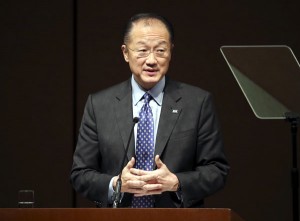Corruption No. 1 foe in developing countries—World Bank

World Bank President Jim Yong Kim. AP FILE PHOTO
WASHINGTON—World Bank chief Jim Yong Kim said Thursday that corruption was the top problem faced by developing countries as he unveiled a new weapon to root out graft.
“In the developing world, corruption is public enemy number one,” Kim said at a conference at World Bank headquarters in Washington.
“Every dollar that a corrupt official or a corrupt business person puts in their pocket is a dollar stolen from a pregnant woman who needs health care; or from a girl or a boy who deserves an education.”
Kim said the private sector should be “part of the solution.”
“Oil, gas, and mining firms are increasingly disclosing their contracts with governments,” he said, providing “a chance” to monitor the activities of both corporate and public officials.
Article continues after this advertisementKim announced that the World Bank will create a single pool of technical experts in rule of law, public sector, financial and state management, and public procurement as a major tool to fight corruption.
Article continues after this advertisementIn 1996, the World Bank for the first time intensified its anti-corruption focus, calling it a “cancer” for poor countries.
“Cancer can be cured,” Kim said.
He said the World Bank was making strides in weeding it out. For example, he said, “when corruption threatened to derail a critical power project for southern African countries, the World Bank intervened, preventing more than $6 million dollars from being misused.”
Other major instances include the World Bank’s cancellation of a $1.2 billion credit for the construction of a bridge in Bangladesh in June 2012 after finding evidence of a high-level corruption conspiracy among Bangladeshi government officials and executives of SNC Lavalin, a Canadian multinational, in connection with the project.
SNC Lavalin was banned from any World Bank contract for 10 years.
In another high-profile instance, in February 2012, two units of French group Alstom had to pay a combined $9.5 million in restitution and were excluded from any Bank contract for three years for bribing officials in Zambia in relation to a Bank-financed hydropower project.